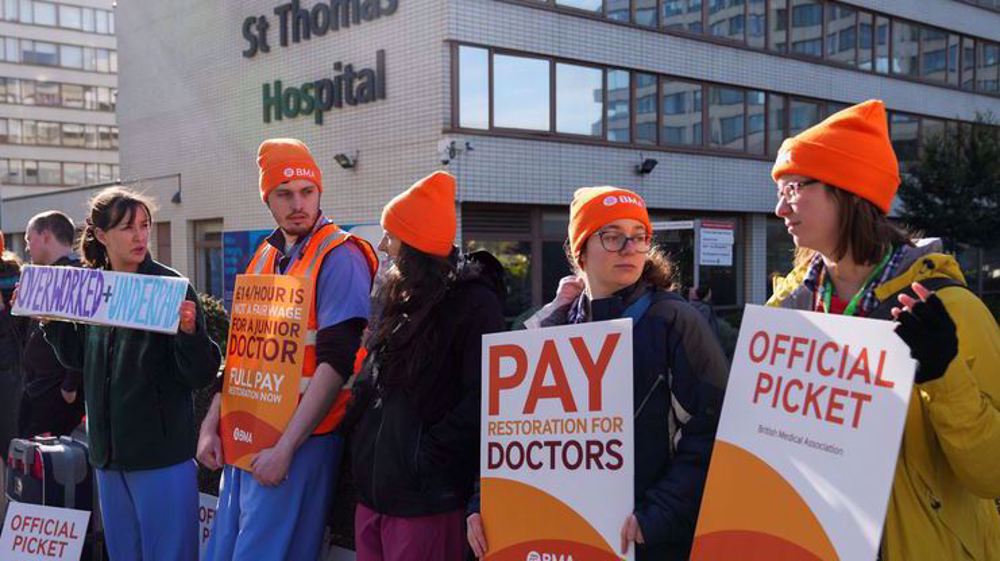Junior doctors in UK start third strike in 2023 over wage increase
Tens-of-thousands of junior doctors across Britain have waged a 3-day strike over low waged in the country, prompting health officials to issues warnings about huge disruptions in the sector.
Nearly 47,600 junior doctors, who are members of the British Medical Association (BMA), took part in the new strike that began on Wednesday and will continue until Saturday.
Government representatives have so far agreed to a five-percent pay raise despite demands by the doctors for a 35-percent wage increase.
Medics have seen a 26 percent pay cut in real terms in the last 15 years as salaries have failed to keep up with the high inflation rate, according to calculations conducted by the BMA's Junior Doctors Committee.
The junior doctors representatives have also warned they will stage more strikes in the coming months if the government sticks to what doctors regard as an insufficient pay increase, but added that they remain open to further negotiations.
On the eve of the strikes by the British doctors, junior doctors in Scotland also rejected what the Scottish Government in Edinburgh called its "final" pay offer of 14.5 percent increase over two years and set strike dates for July.
Hospital executives, meanwhile, have called on both sides of the dispute to reach a fair compromise.
A similar strike In April led to the rescheduling of some 196,000 hospital appointments and operations.
In a related development, British Health Secretary Steve Barclay slammed the junior doctors' strike as "extremely disappointing."
He further called on the young doctors not to put patients’ lives at risk and uphold professional ethical standards of the job.
"If the BMA cancels these damaging and disruptive strikes and shows willingness to move significantly from their position, we can resume confidential talks and find a way forward, as we have done with other unions," he claimed.
Last year, the National Union of Rail, Maritime and Transport Workers (RMT) union leader Mick Lynch warned during a similar dispute with the country’s rail workers that the strikers could continue the industrial action “indefinitely” if their demands were not met.
He further cautioned that the continuous walk outs could cause "significant disruption" unless ministers intervened in the negotiations.
Lynch said back then that the unions were not looking to compromise in their demands for a pay increase so workers could make ends meet and cover the costs of living.
The development comes as people across Britain are experiencing the worst economic conditions in decades, with inflation soaring and the cost-of-living crisis weighing heavily on people’s shoulders.
Inflation in the UK’s grocery market has soared to a record high of 17.1 percent, hitting prices for milk and eggs the hardest.
Making matters worse, British unemployment rate also climbed over the first three months of the year as the skyrocketing inflation also puts pressure on the labor market.
According to a report by the National Bureau of Statistics, the unemployment rate across the UK climbed from 3.8 percent during the three-month period ending in February to 3.9 percent.
Critics blame the ruling Conservative government in the UK for the woes of those struggling in the society, forcing many to turn to food banks amid the cost-of-living crisis and soaring inflation in the country.
Missile fired from Yemen hits Tel Aviv
VIDEO | Iran emerging as aviation service hub through innovative solutions
Iraq exhuming remains of 100 Kurdish women, children killed by Saddam
Panama rejects talks with US over canal control
VIDEO | Israel Yemen aggression
HTS rulers name al-Qaeda operative as Syria's new spy chief
Iran voices concern about rising insecurity, violence in Syria
VIDEO | Karachi sit-in amplifies nationwide call for justice for Parachinar victims











 This makes it easy to access the Press TV website
This makes it easy to access the Press TV website